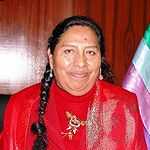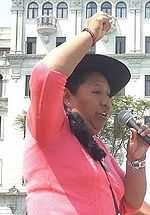María Sumire



María Cleofé Sumire de Conde (born in an indigenous community in Canchis Province, Cusco Region) is a Peruvian politician. She belongs to the Union for Peru party and was a Congresswoman representing Cusco for the period 2006-2011.
María Sumire is the daughter of the founder of the Peasants' Federation of Cusco (Federación Departamental de Campesinos del Cusco), Eduardo Sumire, and was raised in the community of Collachapi (Layo district, Canas province, Cusco region). Her mother tongue is Quechua.
Dr. Sumire is an experienced lawyer from Cusco, who has provided legal advice for the Farmer Federation of Cusco in its struggle for land and women’s organizations. She is a member of the Evangelical Methodist Church, a leader of the Association of Andean Women (AMA) and was one of the 1,000 women candidates for the 2005 Nobel Peace Prize. She said that she will seek to legislate in favor of the development of poor communities from the southern Andes and the decentralization process in the country. Moreover, she will seek to monitor regional governments and to battle against corruption.
She was elected to the Peruvian Congress in 2006, where she was the second Peruvian parliamentarian who was sworn in in Quechua, immediately after her fellow congresswoman Hilaria Supa, for which both were sharply criticized by Martha Hildebrandt and some other members of Congress.[1][2]
María Sumire focuses on indigenous language and land rights of the poor communities in the Andes and indigenous people across Peru. After supporting protests of indigenous people against mining in the Amazon in 2009, she and several other congressmen were suspended for three months.
External links
![]() Media related to María Sumire at Wikimedia Commons
Media related to María Sumire at Wikimedia Commons
- María Sumire: CV (Congreso del Perú, in Spanish)
- María Sumire's personal blog
- Ibis Liulla Torres: Maria Sumire – Woman of Faith and Strength (Methodist website)
References
- ↑ Dina Ludeña Cebrián: Lengua quechua - del miedo y desprecio al respeto y visibilización.
- ↑ Mayra Castillo: En el nombre del quechua. El Comercio, 31 de marzo de 2007